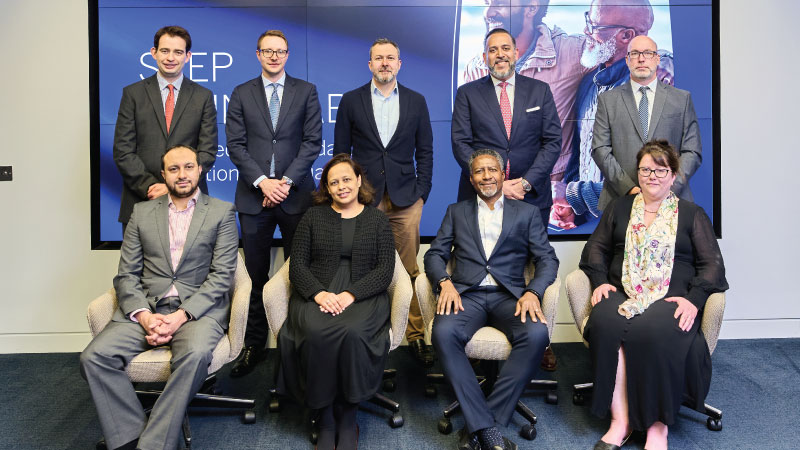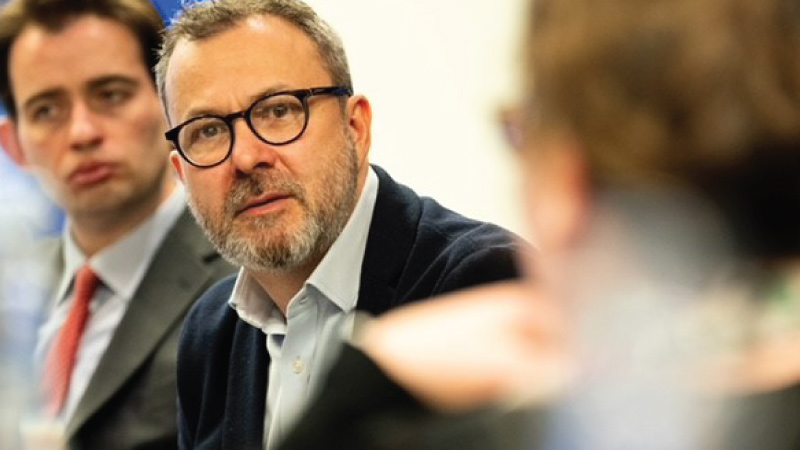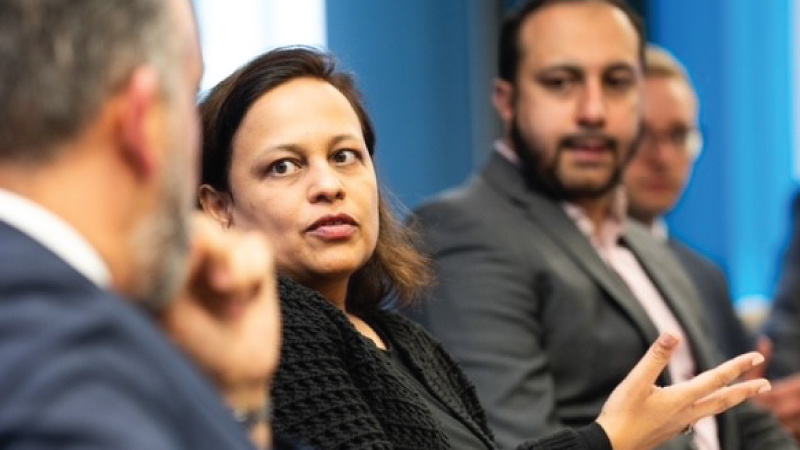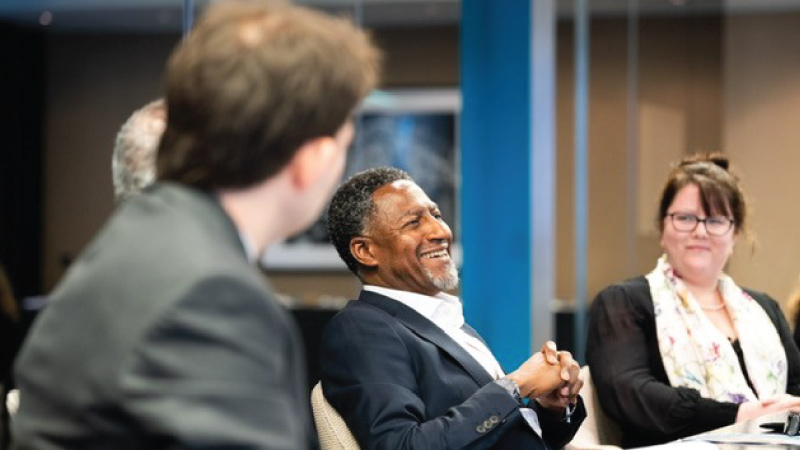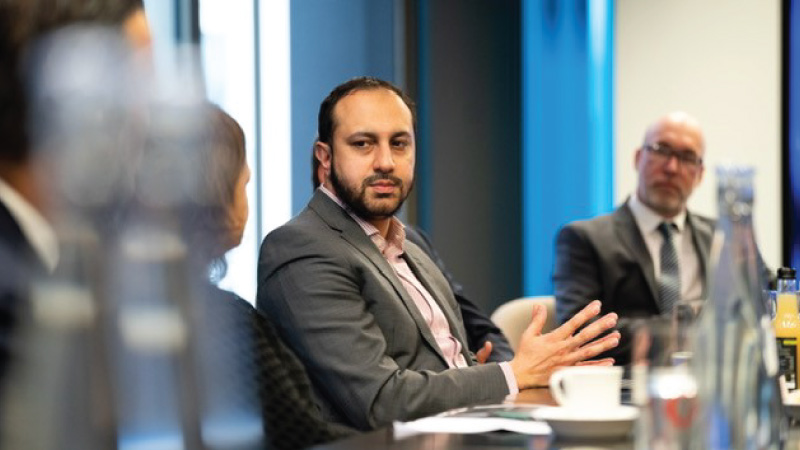
Standard Bank and STEP Roundtable - The evolving landscape in Africa - Write up
A STEP roundtable, sponsored by Standard Bank, asked what the challenges and opportunities are for practitioners advising African families, as these clients grow their wealth and start to operate cross-jurisditionally
- Chair: Michael Giraud TEP, Head of Fiduciary Services, Jersey, Standard Bank
- Jonathan Sprigg TEP, Head of Fiduciary Services, Standard Bank
- David Whittaker, Partner, Mishcon De Reya
- Tahir Ebrahim, Partner, BDO London
- Sanjvee Shah, Partner, Wedlake Bell
- Sevyn Kalsi TEP, Partner, Bedell Cristin
- Kyra Motley TEP, Partner, Boodle Hatfield
- Akin Coker, Partner, Buzzacott
- Jeremy Robertson TEP, Partner, Forsters
In April 2024, nine private client experts came together in London for a STEP roundtable discussion, sponsored by Standard Bank. The conversation focused on the evolving landscape of advising African clients, from reputation and risk to charity and philanthropy.
The Chair, Michael Giraud TEP, Head of Fiduciary Services, Jersey, at Standard Bank, opened the roundtable by noting the increasing globalisation of African families: ‘It is now common in our client base for a family that is African in origin to operate multi-jurisdictionally: a Kenyan family might own property in South Africa, Dubai and Canada, and have dual residency in Africa and the US.’ He therefore asked the roundtable participants what challenges this international picture presents to advisors.
‘It makes the structuring we do more complex ’, responded David Whittaker, Partner at Mishcon De Reya. ‘As well as the challenge of having multiple different generations of family with different ideas around the family wealth, we also have different tax regimes and regulation to marry up. For example, a Nigerian family with children based in the US might want to create a revocable trust in the UK. We need to understand all the tax and reporting implications in the various jurisdictions, as well as getting foreign grantor status. We are now international advisors in a global market.’
Kyra Motley TEP, Partner at Boodle Hatfield, compared today’s practitioner to an architect. ‘A lawyer in the past would be advising, quite simply, on the law’, she explained. ‘Now, they are an architect for the family in bringing all the different touchpoints together and trying to find a solution that works for that family.’
Cultural considerations
Tahir Ebrahim, Partner at BDO London, pointed out that within Africa itself there are huge cultural differences, competing aspirations and views on jurisdictions in which to invest: ‘We need to think about the cultural considerations in each of those regions. The key thing is to be in listening mode: it is very easy to assume we know what is vital to clients, but the goalposts are shifting very dynamically and very quickly.’
However, having the conversation about succession planning can be a thorny issue, from a cultural perspective. ‘From a Nigerian perspective, planning for death is a very difficult discussion to have, as it is seen as a taboo’, warned Akin Coker, Partner at Buzzacott. ‘There is an association between talking about death and wishing it upon yourself. The COVID-19 pandemic slightly shifted that perception but succession often ends up being a deathbed conversation. As a result, there are countless cases where the patriarch or matriarch has died and left chaos for the family to deal with.’
‘And it is not just death that creates havoc, it is health issues like dementia and loss of mental capacity’, agreed Sanjvee Shah, Partner at Wedlake Bell. ‘If you have not got the right arrangements in place it can affect your businesses, as well as your life. Discussions about capacity can be a softer way of asking about people’s plans for the future but it is still a difficult conversation. The cultural gap can be often bridged through giving clients examples of situations other families have experienced, for example, complex cross-border probate situations or costly divorces.’
Sevyn Kalsi TEP, Partner at Bedell Cristin suggested changing the nature of the conversation: ‘There is no natural segue into a discussion about death or loss of capacity, but you can start with a conversation about what a client wants their legacy to be and how they plan to provide that. By starting with delving into what the family’s assets are, there are ways of showing how certain plans might not work. It is about asking what they want to do and what their legacy should be: not talking about death but doing business planning for the future.’
Appropriate structuring
Giraud noted that the succession planning conversation can be difficult for trustees if the patriarch or matriarch does not wish to relinquish control. He commented that this would especially be the case in areas of Africa where trust law is still nascent and families do not necessarily understand how structures work or the role of trustees and advisors.
‘It is a long journey and you have to walk before you can run’, said Whittaker. ‘Different families across the region have different levels of awareness of how a fiduciary structure might work. It is best to start with a small portfolio and get them to understand how those structures work in terms of governance, control mechanisms and family oversight. Then we might move towards a family business, so that they get to better understand the mechanism in place, the flexibility that is allowed and what a private trust company might confer that a trustee cannot.’
The participants commented that for many African clients, the structures in use have been in place since the 1980s, with convoluted governance that is no longer up-to-date or fit for purpose. Many older off-the-shelf solutions have diminished in value and give no consideration to foreign beneficiaries.
‘We have a duty as advisors to make sure that the families understand their structures’, said Kalsi. ‘There is currently a gap in the education and trusts are not about “selling a product”. Clients need flexible structures that can move with the times.’
Ebrahim concurred: ‘The level of wealth of some of these families has increased dramatically since the 1980s, and tax laws globally are moving so quickly that the need for ongoing and regular advice is key.’
Despite the socio-economic downturn caused worldwide by both COVID-19 and the Russian invasion of Ukraine, statistics show that USD2.4 trillion in investable wealth was held on the African continent in 2022. According to the African Development Bank Group’s African Economic Outlook 2023, economic growth in the region is projected to grow at the second-fastest rate in the world in 2023/24. Meanwhile, Henley & Partners’ Africa Wealth Report 2023 reveals that the growth in high-net-worth individuals on the continent is expected to be 42 per cent over the next decade.
‘African family offices are much more internationally focused now and the compliance and governance is very important to them’, observed Jeremy Robertson TEP, Partner at Forsters. ‘They are focused on making clients aware of the worth of having a complete and sophisticated regulatory approach, especially in light of the automatic exchange of information requirements.’
Risk and reputation
The education goes further than families, however, as advisors seek to change perceptions about African ultra-high-net-worth individuals (UHNWIs). Whittaker commented that ‘negative perceptions persist’, while Giraud added that UHNWIs in many African countries are often ‘politically exposed persons [PEPs] by association’ or have connections with PEPs through working for government-controlled companies.
The issues of client reputation have become particularly prevalent in light of increasingly worldwide regulatory requirements and recent years of ongoing sanctions measures. Fiduciary and investment structure providers operating in well-regulated jurisdictions are therefore exercising caution across their entire client base in regards to taking on individuals or families that might carry reputational risk. In particular, participants noted the challenges of building banking relationships for African clients coming from high-risk jurisdictions and carrying potential reputational risk.
‘The best way to approach a bank is to address risk proactively’, suggested Jonathan Sprigg TEP, Head of Fiduciary Services at Standard Bank. ‘Confronting a client’s risk level head-on and being able to explain their circumstances makes a huge difference to building a relationship with a bank.’
Motley agreed: ‘It can be a case of guilty until proven innocent for many African clients. Advisors being proactive about due diligence allows them to grow a relationship with a bank by setting out who they are acting for, the potential risk levels and appropriate responses.’
She raised the issue of the importance of addressing any media reports about families, especially if those reports are unsubstantiated. ‘There is also the problem of politically motivated prosecutions against clients without any basis at all’, added Robertson. ‘A case may have been quickly thrown out of court, but remnants of it can come up in client searches and in the media and can be picked up by the banks they want to build a relationship with. Knowing all this in advance and planning for such issues can help mitigate those problems.’
‘To be able to present all that information, you have to be documenting how you are managing a client and their structure with appropriate due-diligence’, responded Sprigg. ‘In recent years, that has become a matter of addressing not only the source of the funds but documenting the alternative usage of assets: those are the questions that banks’ compliance and risk departments will want answers to.’
Following the money
‘These banking issues also prove challenging when it comes to a family wanting to engage with philanthropy’, said Shah. ‘Banks want a lot of documentation to ensure that money designated for philanthropy is actually being used for charitable purposes. Regulators are inspecting structures, procedures and policies to ensure that gifts that are going particularly to high-risk countries are properly managed.’
However, the participants acknowledged that African clients’ philanthropy is often undertaken very informally; in other words, outside of a formal charitable structure. Examples included UHNWIs informally funding local infrastructure such as hospitals, schools and roads, and social enterprise such as conservation and supporting rural communities to learn skills.
‘Because of the nature of where clients are, it is difficult to get the data to support the outcomes of those activities’, Shah commented. ‘You cannot underestimate how rural these communities are. It is hard for a charity that is run by non-professional individuals to produce the information that the regulators want to see. The regulators need evidence of as much governance as possible and of the oversight of trustees to ensure that the money is being used only for charitable purposes.’
Motley observed: ‘It is really important for the professional advisory community to be having these discussions with clients. If they put proper governance around their charitable structures, they could make their money go further and have a better impact. A lot of the big grant-making charities have very experienced wealth-makers looking at the structures and the outcomes and making sure the money goes to the right places. For families that care about making a difference, a structure with the right people involved to put a framework around that charitable giving could make their money have an even greater impact.’
Structured advice
‘In different African countries there are very different levels of advice: there can be a vacuum of solid, regulated advice’, warned Kalsi. ‘There are more multi-family offices springing up so there is potentially a greater need for sophisticated advisors in these jurisdictions.’
Coker agreed: ‘The family office-type structure is going to be the future trend in many African countries: we will see a lot of family-owned or -managed businesses becoming family-controlled with external management. Families are looking at their shared goals, what they want the business to do and how they can make that happen. That is where the external management of a family office comes in to support them.’
‘There is an education piece there, educating families on what a family office does and the value-add’, noted Whittaker. ‘We need to show clients the importance of someone managing the managers, looking after the protocols, managing the service relationships between the asset-holding structures…how it will save them time and money with advisors dedicated to them and their structures.’
‘The need for family offices in Africa is definitely changing, as clients are realising they need more international advice on dynamics,’ concurred Sprigg. ‘The more challenges in terms of the shifting sands of taxes and regulation, the more clients need something stable and with longevity in place. The advice is becoming more sophisticated across the continent and there is a huge opportunity for African families in terms of structuring for the next generations.’
#familybusinessandfamilyoffice #trusts #regulationandcompliance #thoughtleadership
Helen Bradford-Swire
A version of this article was first published in the STEP Journal STEP Journal, Issue 4 2024.
Click here to read more about our international fiduciary services.

